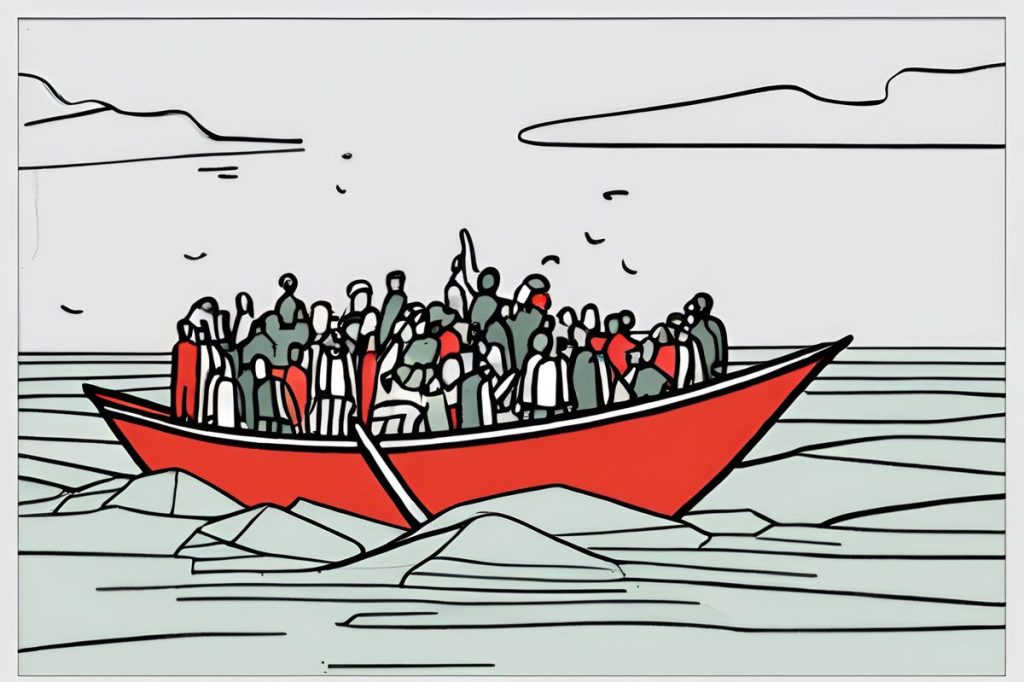Cyprus is facing a surge in irregular migrants, with 476 individuals arriving in ten boats over three days, straining its coastal defenses and asylum process systems. Authorities are rescuing migrants, including unaccompanied children, while also arresting those involved in people smuggling, putting significant strain on social services and prompting an emergency National Security Council meeting.
What challenges is Cyprus facing due to the recent surge in migrant arrivals?
Cyprus is grappling with a surge in irregular migrants, with 476 individuals arriving in ten boats over three days, stretching its coastal defenses and asylum process systems. Authorities are balancing between rescuing migrants, including unaccompanied children, and arresting those involved in people smuggling. The situation has put significant strain on the country’s social services and infrastructure, prompting an emergency National Security Council meeting.
Recent Influx of Irregular Migrants
In a span of just three days, a significant wave of migrant arrivals has challenged the coastal defenses of Cyprus. Authorities reported that ten boats, filled with 476 irregular migrants, were intercepted as they sought refuge on the island. This sudden surge highlights the ongoing challenges nations face in managing border security while adhering to humanitarian obligations.
Law enforcement officials have undertaken extensive efforts to identify and arrest those responsible for the maritime crossings. Notably, nine individuals suspected of involvement in people smuggling were detained. These arrests reflect the complexities nations must navigate between providing safe passage for asylum seekers and cracking down on criminal trafficking networks.
Maritime Operations and Legal Proceedings
The arrival of the migrant boats sets in motion a sequence of critical response measures by Cypriot authorities. In a meticulous operation during the early hours of Tuesday, two boats were intercepted near Cape Greco—a southeastern sea area known for such incidents. The migrants aboard, including a number of unaccompanied children, were subsequently escorted to the Ayia Napa marina. From there, they were transferred to a reception center, marking the beginning of their asylum process.
The legal ramifications for those piloting the vessels are immediate and severe. Two Syrian nationals, aged 26 and 52, were among those arrested and presented to the district court. The swift judicial response underscores Cyprus’s commitment to maintaining order while facing an escalating migration challenge.
Mounting Pressures and International Response
The situation reached a critical point on Tuesday as the National Security Council convened for an emergency meeting. The discourse centered on Cyprus’s “breaking point” concerning the capacity to accommodate new asylum seekers. The meeting signified the immense strain irregular migration can place on a country’s social services and infrastructure.
The international community keeps a watchful eye on such events, often providing support through various agencies. The United Nations High Commissioner for Refugees (UNHCR) and other international organizations typically step in to ensure that the rights of migrants are respected amidst the complex legal and social dynamics.
Contextual Background of Migrants
The origins of these migrants, predominantly from war-torn regions like Syria and Lebanon, point to the larger geopolitical crises that drive such movements. Push factors include conflict, persecution, and economic destitution, propelling individuals and families to embark on perilous journeys in search of safety and stability.
Notably, the Eastern Mediterranean route has been a major gateway for individuals fleeing the Middle East and North Africa. Despite the perilous nature of this journey, the pursuit of a better life motivates these desperate sea crossings.
By considering the complexities of the events, this recent development in Cyprus serves as a microcosm of the broader issues surrounding global migration. It underscores the need for a balance between national security concerns and humanitarian imperatives, a challenge that nations around the world continue to grapple with.
What challenges is Cyprus facing due to the recent surge in migrant arrivals?
Cyprus is grappling with a surge in irregular migrants, with 476 individuals arriving in ten boats over three days, stretching its coastal defenses and asylum process systems. Authorities are balancing between rescuing migrants, including unaccompanied children, and arresting those involved in people smuggling. The situation has put significant strain on the country’s social services and infrastructure, prompting an emergency National Security Council meeting.
How are Cypriot authorities responding to the recent influx of irregular migrants?
Cypriot authorities have been conducting maritime operations to intercept and rescue migrant boats arriving on the island. Law enforcement officials are also actively identifying and arresting individuals involved in people smuggling. The migrants are then transferred to reception centers to begin the asylum process, while those responsible for the maritime crossings face immediate legal proceedings.
What international support is Cyprus receiving in managing the migrant crisis?
The recent surge in migrant arrivals in Cyprus has drawn the attention of the international community. Organizations like the United Nations High Commissioner for Refugees (UNHCR) and other international agencies often provide support to ensure the rights of migrants are respected amidst the complex legal and social dynamics of irregular migration. This underscores the global nature of the migrant crisis and the need for coordinated efforts.
What are some of the reasons driving the migrant arrivals to Cyprus?
The migrants arriving in Cyprus primarily come from conflict-ridden regions like Syria and Lebanon, seeking safety and stability. Push factors such as conflict, persecution, and economic destitution in their home countries compel individuals and families to undertake risky journeys in search of a better life. The Eastern Mediterranean route has been a major pathway for migrants fleeing the Middle East and North Africa, highlighting the ongoing global migration challenges.

